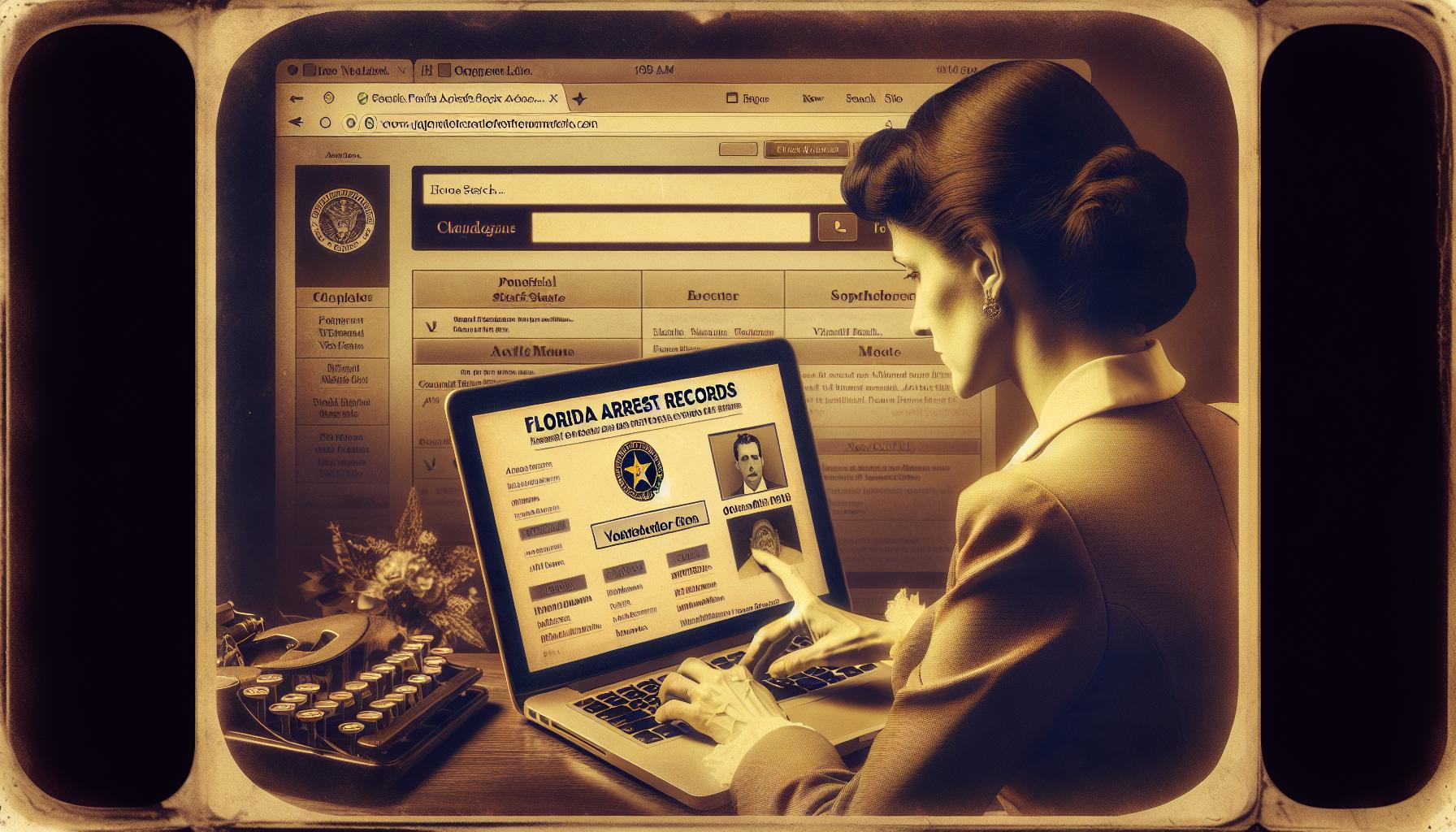Seeking free Florida public records?
Florida's public records system provides extensive access to government information. These records offer valuable insights into various aspects of life, government operations, and legal proceedings in the state.
What Are Public Records?
Public records in Florida encompass a wide range of documents and information maintained by public agencies. Chapter 119 of the Florida Statutes, known as the "Public Records Law," defines these records. They include:
- Documents, letters, papers, and books
- Digital recordings, tapes, photographs, and data processing software
- Records generated by state, county, or municipal agencies
- Information from the three main branches of government
Florida's public records cover various types of information:
- Court Records: Civil, family, criminal, and probate records from court proceedings
- Property Records: Deeds, mortgages, and tax assessments
- Vital Records: Birth, death, marriage, and divorce certificates
- Business Records: Corporate filings, licenses, and permits
- Government Documents: Meeting minutes, budgets, and contracts
Florida Sunshine Law
The Florida Sunshine Law, enacted in 1967, reinforces the state's commitment to government transparency. Key aspects of this law include:
- Open Meetings: Government bodies must conduct meetings in public
- Notice Requirements: Agencies must provide advance notice of meetings
- Record Keeping: Minutes of meetings must be recorded and made available
- Limited Exemptions: Specific types of information may be exempt from disclosure
- Enforcement: Citizens can sue government entities for non-compliance
The Sunshine Law works in conjunction with the Public Records Law to ensure Floridians have access to government information and decision-making processes. This transparency promotes accountability and informed civic participation.
Types of Free Florida Public Records
Florida offers a wide range of free public records accessible to citizens and researchers. These records are categorized into different types, each providing specific information about individuals, properties, and government activities.
Court Records
Florida court records are maintained by county clerks and are generally accessible to the public. You can access various court records, including:
- Civil cases
- Family cases
- Criminal cases
- Probate cases
Access these records through online systems or by visiting the local county courthouse. The Florida District Courts of Appeal provide an online Appellate Case Information System (ACIS) for accessing public case documents and dockets. Some counties, like Pinellas County, offer free online services to view court case information and documents.
Official Records
Official records in Florida include various legal and administrative documents:
- Deeds
- Mortgages
- Marriage licenses
- Affidavits
- Power of attorney
County clerk's offices maintain these records, making them accessible to the public for research and verification purposes.
Vital Records
Vital records in Florida encompass essential life events documentation:
- Birth certificates
- Death certificates
- Marriage records
- Divorce records
The Florida Department of Health's Office of Vital Statistics maintains these records. While some vital records are freely accessible, others may require fees or have restrictions due to privacy concerns.
Property Records
Florida property records provide information about real estate ownership and transactions:
- Property deeds
- Mortgages
- Liens
- Property tax records
- Property assessments
County property appraiser offices and tax collector websites often provide free access to these records. These documents offer valuable insights into property values, ownership history, and local real estate trends.
How to Access Free Florida Public Records

Accessing free Florida public records is straightforward with various online and offline resources available. Here's how you can obtain these records without incurring any costs:
Online Resources
Florida's state and county databases offer extensive free public record searches. The Florida Department of State Division of Corporations provides a free search tool for business entities, including corporations and LLCs. For court records, the Florida Court Records system allows you to search civil, criminal, traffic, probate, and family court records across the state's Supreme and Appeals Courts, as well as county courts. The Florida Department of Health's Vital Statistics office offers basic information on birth, death, marriage, and divorce records at no charge.
County Clerk Offices
County Clerk offices serve as primary custodians of local public records. These offices maintain official records such as property deeds, marriage licenses, and court documents. Many County Clerk offices in Florida now provide online portals for free record searches. For records not available online, you can visit the physical office location to request and view documents at no cost. Some counties may charge a small fee for printed copies, but viewing the records is typically free.
State Archives
The State Archives of Florida, managed by the Division of Library and Information Services, houses a wealth of historical records and documents. These archives include government records, manuscripts, photographs, and maps dating back to the territorial period. While some records are available through their online catalog, others require an in-person visit to the archives in Tallahassee. The State Archives offers free public access to its collections, allowing researchers and history enthusiasts to explore Florida's rich past without charge.
Running a Background Check Using Public Records
Florida's public records offer valuable resources for conducting background checks. You can access various types of information to build a comprehensive profile of an individual or entity.
Criminal Records
The Florida Department of Law Enforcement (FDLE) maintains criminal records. Access instant, certified, or non-certified searches through their online services for a fee of $24 plus a $1 credit card processing fee. For free options, use the Florida Crime Information Center Public Access System to search for wanted persons, sex offenders, and other crime-related information.
Civil Records
Civil records, including court cases, are managed by the clerks of the circuit courts in each Florida county. Many counties offer free online access to civil records through their websites. Some records require a subscription or fee for access. Search for specific county clerk websites to find available civil records and access options.
Professional Licenses
The Florida Department of Business and Professional Regulation (DBPR) provides a free online search tool for verifying professional licenses. Use this resource to check the status of licenses for various professions, including contractors, real estate agents, and cosmetologists. The Florida Department of Health also offers a similar tool for healthcare-related licenses.
Protecting Personal Information
Florida law provides mechanisms to safeguard personal information from public disclosure. You can take steps to protect sensitive data in public records through redaction, confidentiality orders, and sealing or expunging records.
Redaction Process
Redaction removes specific personal information from public records. To redact personal data in Florida:
- Identify the documents containing sensitive information
- Download the "Request to Redact Personal Information Form" from your county's Official Records Department
- Complete the form with your contact details and the documents requiring redaction
- Submit the form to the relevant records department
Redactable information includes Social Security numbers, bank account numbers, and credit or debit card numbers.
Confidentiality Orders
Confidentiality orders protect sensitive information in court proceedings. To obtain a confidentiality order:
- File a motion with the court explaining the need for confidentiality
- Demonstrate good cause for protecting the information
- Specify the exact information to be kept confidential
- Attend a hearing where a judge decides on the order
Confidentiality orders typically apply to trade secrets, proprietary business information, or sensitive personal data.
Sealing and Expunging Records
Sealing and expunging records limit public access to certain criminal records. The process involves:
- Verify eligibility through the Florida Department of Law Enforcement (FDLE)
- Obtain certified copies of court documents and dispositions
- Complete the appropriate application form (sealing or expungement)
- Submit the application, supporting documents, and processing fee to FDLE
Sealed records remain accessible to certain government agencies, while expunged records are physically destroyed, with only a confidential record maintained by the FDLE.
Limitations and Restrictions
While Florida's public records laws are designed to promote transparency, there are important limitations and restrictions to be aware of. These restrictions protect sensitive information and maintain privacy in certain cases.
Exempt Records
Florida law exempts specific records from public disclosure to safeguard privacy and security. Death certificates containing cause of death remain confidential for 50 years, accessible only to immediate family or authorized representatives. Court records involving special victims, juvenile delinquency, or dependency cases are not publicly available online. The Florida Legislature has also limited the information available on Clerk's Office websites, particularly for confidential official records.
Fees for Certain Records
While many public records in Florida are free to access, some agencies charge fees for certain records or services. These fees typically cover the cost of reproduction, labor, or special processing. Large or complex requests may incur additional charges. Always check with the specific agency or office for their fee schedule before requesting records. Some agencies offer fee waivers for specific circumstances or provide a certain number of pages free of charge before applying fees.
Frequently Asked Questions
What types of public records are available for free in Florida?
Florida offers a wide range of free public records, including property records, court documents, criminal histories, and business filings. These records are accessible due to Florida's robust open records laws, which provide extensive access to government information. The types of records available include court records, official records, vital records, and property records.
How can I access Florida's public records online?
Many public records in Florida can be accessed online through various resources. The Florida Department of State Division of Corporations offers a free search tool for business records. Court records can be found through the Florida Court Records system. Many county clerk offices provide online portals for free searches of local public records. Additionally, the State Archives of Florida offers access to historical records.
Are criminal records part of Florida's public records?
Yes, criminal records are part of Florida's public records. The Florida Department of Law Enforcement (FDLE) maintains criminal records and offers both paid and free search options. However, some records may be exempt from public disclosure, such as those involving special victims or juvenile cases. It's important to note that while many records are free, some agencies may charge fees for specific records or services.
How can I protect my personal information in Florida's public records?
Florida provides several mechanisms to protect personal information in public records. These include redaction of sensitive information, obtaining confidentiality orders for court proceedings, and sealing or expunging criminal records. To protect your information, you can request redaction of specific details, apply for confidentiality orders in court cases, or pursue sealing or expungement of eligible criminal records through proper legal channels.
Are there any limitations on accessing Florida's public records?
While Florida has broad public records laws, there are some limitations and restrictions. Certain records, such as death certificates and some court records, are exempt from public disclosure. Additionally, while many records are free, some agencies may charge fees for specific records or services, especially for large or complex requests. It's advisable to check with individual agencies for their specific policies and fee schedules.
